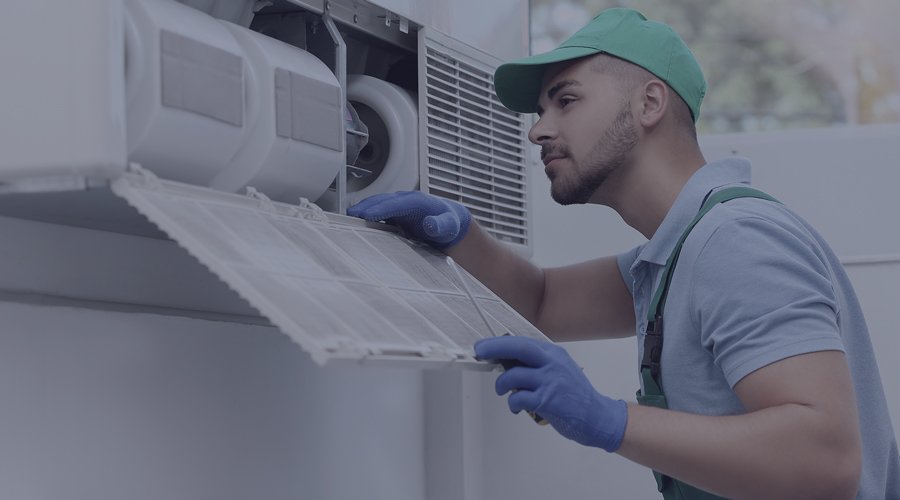
If you’re an HVAC technician who is considering taking the leap and starting your own HVAC business, you might be wondering where to begin and how to ensure success.
Approximately 45% of businesses fail in their first five years if proper planning and execution is not practiced. For an HVAC company, failure can be a result of many things including failure to change, adapt, implement new services or procedures, and more.
The biggest contributing factor to failure for a contractor who wants to start an HVAC business is when they are unable to shift from employee or HVAC contractor to a business owner and a leadership role.
HVAC companies are a great year-round business. To start your own HVAC company, you’ll need to be prepared to handle and oversee all aspects of the business. This includes sales, dispatching, answering phone, marketing, billing, maintenance agreements (and a way to track them), and vehicle maintenance—all while ensuring great service is being provided.
Projected HVAC industry growth
The global HVAC industry is projected to reach about $367.5 billion USD by 2030. This growth is predicted based on the continued growth in construction sector revenues, from both publicly and privately funded projects.
Air conditioning is proving to be a big area of growth within the HVAC industry. Mini-split air conditioners have contributed to more than half of the HVAC market sales revenue as a whole. These units are fairly easy to install and the demand for air conditioning, in general, has been steadily increasing as global temperatures continue to rise.
Additionally, when furnaces or air conditioning units need to be repaired or replaced, it is rare that homeowners are able to delay this type of service. Proper heating and cooling systems are essential to providing comfort and livable conditions inside a home.
As housing costs rise and people are spending more time at home, consumers are more motivated to invest in upgrading their current heating and cooling systems. This is just part of the reason why now is a great time to be in the HVAC industry!
How do I start my own HVAC business?
Assuming you already have a business license, an HVAC license, and all the required certifications to run an HVAC company, here are the remaining steps to starting an HVAC business:
- Determine your value proposition
- Create a pricing strategy
- Invest in the right equipment
- Hire the right people
- Establish an online presence
- Don’t skip out on marketing
- Track your fleet using GPS
Let’s dive into the specifics…
1. Determine your value proposition
When starting out, you may notice that there are already a number of HVAC businesses in your area. In order to stand out, you will need to determine your value proposition. What sets you apart from the others and what gives you that competitive advantage?
We recommend developing a customer service strategy that will set you apart from the rest. Consider how your HVAC company will deliver the best service and leave customers more than satisfied.
Don’t get pigeonholed into comparing yourself with other HVAC companies exclusively. To pin down what can make you truly unique, look outside of the HVAC industry. Take notes from leading global brands like The Four Seasons Resorts, Apple, and Tesla. What sets them apart and how can you apply that idea to your HVAC business?
2. Create a pricing strategy
Once you’ve determined your value proposition, you will need to set a price for your services. Begin by calculating your overhead costs and business expenses. With this in mind, determine what you’ll need to charge in order to turn a profit.
Take a look at what some of the established HVAC companies in your area are charging and use this information to develop your own pricing strategy. Do some in-depth research and digging if you have to. Go beyond websites; send some emails, make some phone calls, and ask detailed questions about the services provided.
Creating a pricing strategy that is both competitive and lucrative is a process that should not be rushed.
3. Invest in the right equipment
To run a successful HVAC company you will need the right equipment. When you’re compiling your startup costs, make sure to include the following equipment as part of what you’ll need:
- Work van(s)
- Pressure gauges
- Ohm meters
- Leak detectors
- Vacuum pump
- Wire stripping tools
- General tools (cordless drills, wrenches, tape measures, etc.)
- Safety equipment
The work van(s) you purchase will need to be big enough to fit all the necessary HVAC tools and equipment, plus leave enough space for employees and contractors to travel safely in.
You’ll also need to consider storage and a business address. Where you will store all the equipment, tools, and vehicles and how much space will you need? Consider if you can manage with a small space or if you’ll be looking for something a little bigger with bay doors, for example.
4. Hire the right people
Having enough staff is often a major growth limitation for small businesses. Understanding capacity and when you should hire for what roles will be critical, but building the right team will need to be your primary focus if you want to run a successful HVAC business.
Hire strategically
Start by focusing on your strengths as an individual and hire people who complement your weaknesses. For example, at an executive level, if you have a ton of experience as a technician, consider hiring people who have more business experience.
As for hiring technicians, this can be a bit more challenging in the home services industry. Many companies will be vying for the top (but very limited) talent – and these individuals can come at a very high price. A smart solution is to hire younger technicians that are eager to get trained and into the field. Hiring based on character and attitude is a strategic move as you can teach and refine hands-on skill sets, but you can’t train integrity and work ethic.
Create a desirable work environment
Going one step further, try to make your HVAC business a place where people want to work. Treat employees well, consider them in all your decisions, and this will naturally bring more and more of the right people to your company. It will be exponentially easier to grow and succeed with the right team behind you.
Have the right outlook
Be sure to have a positive outlook on hiring and wages. See these areas of business as an investment, rather than an expense. You can’t grow without the right people in the right place and sometimes that means extending yourself temporarily to enable that growth. In hiring, as with many things, you get what you pay for!

5. Establish an online presence
Even in the HVAC industry, most of your customers will find you online. When starting a business, you’ll need to establish an online presence for potential customers and clients to find and contact you. Relying solely on word of mouth or referrals is a risky way to do a business and will leave you missing out on growth opportunities.
Start by building a website
Work with a reputable web developer and SEO strategist to help your website rank in Google search results. Your website will need to be easy to find and easy to use for your company to grow and generate leads online.
Don’t forget about social media
Using social media will also help to grow your online presence and reach your target market. Stick to social media platforms like Facebook and LinkedIn for your HVAC company.
6. Don’t skip out on marketing
Small business owners know the power of marketing. For an HVAC company, it will be important to market both online and offline. Below are specific marketing tactics and key messaging for both online and offline marketing:
Online marketing tactics can include
- Email marketing
- Search engine advertising
- Social media
- Blogging
- Online reviews
Offline marketing tactics include
- Printed collateral
- Yard signage
- Branded vehicle wraps
- Community sponsorships
- Association memberships
Messaging
Marketing your HVAC business is a great way to communicate your competitive advantage to would-be customers. Let your prospects know what problems you solve for them and leverage your value propositions to draw new clients and customers in.
7. Track your fleet using GPS
Once you’ve built your team and have work vehicles on the road, it is vital to track your company vehicles and driver behavior in order to run a successful HVAC business.
Modern GPS tracking systems like Force Fleet Tracking allow business owners to see exactly where your fleet vehicles are at all times, how those vehicles are being driven, and the overall health of your vehicles.
Tracking & driver behavior
Knowing how and where your employees are driving company vehicles can help with staffing and training. Being able to monitor when drivers are braking harshly or speeding can illuminate opportunities to coach staff or when it’s time to rehire.
Vehicle health
Vehicle tracking software like Force allows you to quickly and easily see valuable data on all your company vehicles including:
- Fuel levels and consumption
- Battery health
- DTCs
- Recalls
Vehicle safety
Even when your vehicles aren’t on the road, it’s helpful to keep an eye on this important business asset. Force allows you to set up custom notifications to notify you if the vehicles have been disturbed, towed, or stolen, giving you an added layer of security and protection on your investment.

Getting started with fleet tracking for your growing business
Implementing a GPS fleet tracking system like Force is easy. Simply plug the device into the OBD-II port of your vehicle and start tracking and collecting real-time data through our easy-to-use dashboard.
You can even try Force for 14 days. We’ll ship you the tracking device to try for yourself. Once you’ve set up a free trial account online, you’ll be able to track and manage all the data and information that is collected and displayed. Our dashboard can be accessed by smartphone, tablet, laptop, or desktop so you can manage your fleet from anywhere.
Gain full visibility and see where your HVAC business is going with Force Fleet Tracking.